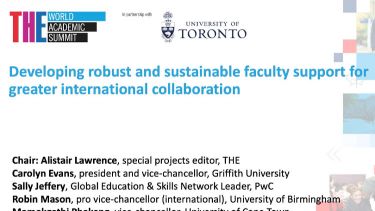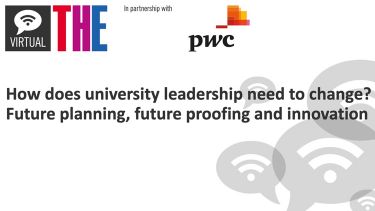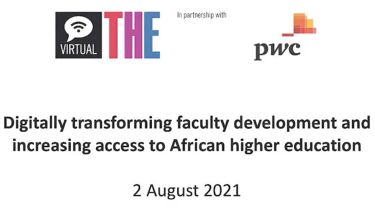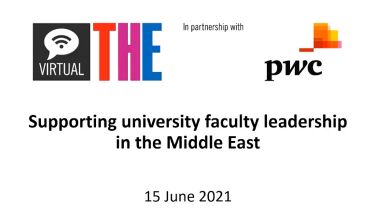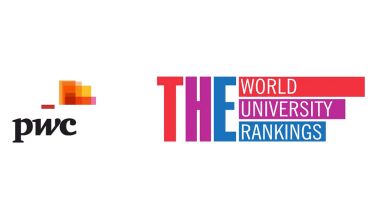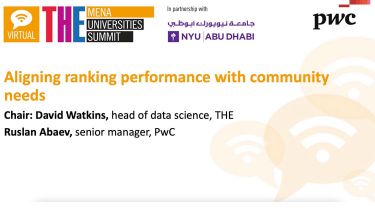Digital technology, data analytics and innovation clusters can support university leaders to innovate
Technology offers the opportunity to transform teaching and learning and to upscale research, but it must not come at the expense of universities’ greater purpose.
A Times Higher Education roundtable, held in partnership with PwC, brought together higher education leaders from Australia and Singapore to examine how universities could be supported to innovate while staying true to their missions.
Chair Joyce Lau, Asia editor at THE, asked how analytics, artificial intelligence and other digital technologies were changing the delivery of education.
Pascale Quester, vice-chancellor and president of Swinburne University of Technology, said universities had so far utilised digital technology to teach what they had traditionally taught but to deliver it in a novel way. “I think the most exciting challenge is to actually think about entirely new paradigms of education that will be enabled through the discovery and the exploration of these technologies,” she said.
Liz Johnson, deputy vice-chancellor of education at Deakin University, said there was also an opportunity for teachers to inform and refine their methods to make them “pertinent, relevant and effective”.
Freddy Boey, deputy president of innovation and enterprise at the National University of Singapore, asked whether it was time to fundamentally reconsider teaching and learning methods. “What technology has done is shifted the whole gravity towards the learner, and it has become learning-centric rather than teaching-centric,” he said.
Alan Kin-Tak Lau, pro vice-chancellor of international and digital research at Swinburne University of Technology, agreed that technology should be harnessed in course design. “The most important [matter] is how we develop the teaching materials and the structure of courses,” he said. “We have to think about some way that is more attractive for the student to learn.”
While the sector was right to be excited about this new era of digital learning, Carolyn Evans, vice-chancellor and president of Griffith University, warned that there was potential to exacerbate the digital divide.
“The assumption that everyone has access to the internet is not accurate. The assumption that everybody has a safe, quiet space at home where they can engage in all of these exciting creative elements is not accurate,” she said.
Rebecca Murray, vice-principal of strategy at the University of Sydney, said technology could also be used to improve areas outside teaching and learning. Utilising data analytics, for example, could help to personalise the student experience.
When asked about the potential of “clusters”, or innovation precincts, Chris Matthews, higher education leader at PwC Australia, said having a clear precinct strategy agreed upfront by key parties often determined their long-term success.
Matthews said the most successful precincts were “transparent” about the value each party could derive, had a “specificity of purpose”, proximity to an innovation ecosystem, and effective governance on the decades-long journey.
Tristan Hockley, government and public sector leader for PwC South-east Asia, said commercialising research was “so important” but should not be prioritised at the expense of the long-term research agenda.
Nicolas Smith, provost at QUT, rejected the notion that increased commercialisation of research could replace income lost from the recent shortfall in international student numbers.
“If we want universities to make money, there’s many things we could do…but our mission, I believe, is doing large-scale, high intellectual risk bets – many of which will fail – on the premise that in aggregation they really move society forward,” he said.
The panel:
- Freddy Boey, deputy president of innovation and enterprise, National University of Singapore
- Carolyn Evans, vice-chancellor and president, Griffith University
- Tristan Hockley, government and public sector leader, PwC South-east Asia
- Liz Johnson, deputy vice-chancellor of education, Deakin University
- Alan Kin-Tak Lau, pro vice-chancellor of international and digital research, Swinburne University of Technology
- Joyce Lau, Asia editor, Times Higher Education (chair)
- Rebecca Murray, vice-principal of strategy, University of Sydney
- Chris Matthews, higher education leader, PwC Australia
- Pascale Quester, vice-chancellor and president, Swinburne University of Technology
- Nicolas Smith, provost, QUT
- Hao Tan, international engagement director, Newcastle Business School, University of Newcastle Australia
Watch the roundtable on demand above or on the THE Connect YouTube channel.
Find out more about PwC.

